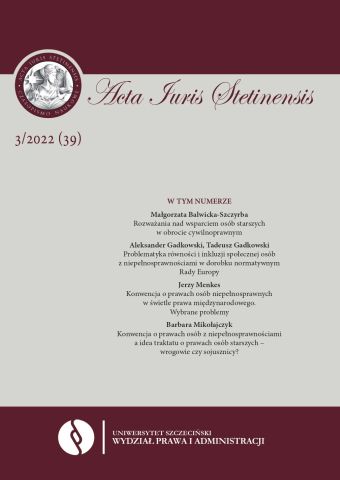







| Authors: |
Barbara
Mikołajczyk

Uniwersytet Śląski w Katowicach |
| Keywords: | rights of older persons rights of persons with disabilities Open-Ended Working Group on Ageing human rights |
| Data publikacji całości: | 2022 |
| Page range: | 12 (117-128) |
| Downloads ?: | 138 |
| 1. | Baxi U., Too Many, or Too Few, Human Rights, „Human Rights Law Review” 2001, vol. 1, nr 1. |
| 2. | Broderick A., The United Nations Convention on the Rights of Persons with Disabilities and the European Convention on Human Rights: a Tale of Two Halves or a Potentially Unified Vision of Human Rights?, „Cambridge International Law Journal” 2018, vol. 7, nr 2. |
| 3. | Daichman L.S., Elder Abuse in Developing Nations, w: M.L. Johnson (red.), The Cambridge Handbook of Age and Ageing, Cambridge 2005. |
| 4. | Doron I., Mewhinney K., The Rights of Older Persons: Collection of International Documents, Eds. Association for the Planning and Development of Services for the Aged in Israel, 2007, https://ifa.ngo/publication/rights-of-older-people/the-rights-ofolder-persons-a-collection-of-international-documents. |
| 5. | Hack M.R., Mandatory Retirement Age(s) in Germany, „European Commission, European Equality Law Review” 2017, nr 2. |
| 6. | Harpur P., Old Age Is Not Just Impairment: The CRPD and the Need for a Convention on Older Persons, „University of Pennsylvania Journal of International Law” 2016, vol. 37, nr 3. |
| 7. | HelpAge International, Older people in Kenya must be protected from witchcraft accusations, 22 October 2021, www.helpage.org/newsroom/latest-news/older-people-mustbe-protected-from-witchcraft-accusations. |
| 8. | Herro A., The Human Rights of Older Persons: the Politics and Substance of the UN Open-Ended Working Group on Ageing, „Australian Journal of Human Rights” 2017, vol. 23, nr 1. |
| 9. | Herro A., Byrnes A., Transcending the Framing Contests over the Human Rights of Older Persons, Australian Year Book of International Law 2020, vol. 38. |
| 10. | Herro A., The Pre-negotiations of UN Human Rights Treaties: The Case of the Convention of the Rights of the Rights of Persons with Disabilities, „International Negotiations” 2019, vol. 24. |
| 11. | Human Rights Council Advisory Committee, Working Paper prepared by Mrs Chinsung Chung, 4 December 2009, A/HRC/AC/4/CRP.1. |
| 12. | Lewis B., Purser K., Mackie K., The Human Rights of Older Persons, Singapore 2020. |
| 13. | Martin C., Rodriguez-Pinzon D., Brown B., Human Rights of Older People: Universal and Regional Legal Perspectives, Dordrecht 2015. |
| 14. | Mikołajczyk B., Konwencja o prawach osób niepełnosprawnych jako nowy typ traktatu, w: A. Poczobut, K. Myszona-Kostrzewa, E. Mikos-Skuza (red.), Prawo międzynarodowe – teraźniejszość, perspektywy, dylematy, Warszawa 2013. |
| 15. | Mikołajczyk B., Qvo vadis NGO: kilka o uwag o „niepodmiotowości” organizacji pozarządowych, w: E. Cała-Wacinkiewicz, J. Menkes, J. Nowakowska-Małusecka, W. Staszewski (red.), Podmiotowość prawnomiędzynarodowa i jej współczesne aspekty, Warszawa 2020. |
| 16. | Mikołajczyk B., The Council of Europe’s Approach towards Ageism, w: L. Ayalon, C. Tesch-Römer (red.), Contemporary Perspectives on Ageism, New York 2018. |
| 17. | Quinn G. Degener T., The current use and future potential of United Nations human rights instruments in the context of disability, United Nations New York and Geneva 2002. |
| 18. | Schechter M., United Nations Global Conferences, 1st ed. Routledge, 2005. |
| 19. | Schulmann K., Ilinca S., Rodrigues R., Pateisky D., From Disability Rights towards a Rights-based Approach to Long-term Care in Europe, Vienna 2017. |
| 20. | Stuckelberger A., Abrams D., Chastonay P., Age Discrimination as a Source of Exclusion in Europe: the Need for a Human Rights Plan for Older Persons, w: T. Scharf, N. Keating (red.), From Exclusion to Inclusion in Old Age, Bristol 2012. |